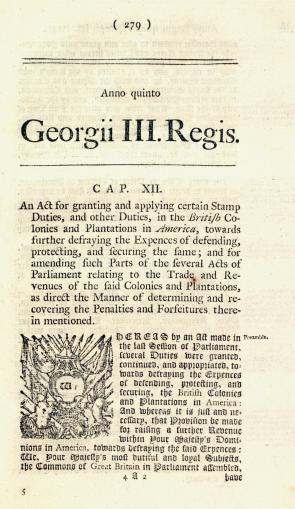

On March 22, 1765, the British Parliament passed the “Stamp Act” to help pay for British troops stationed in the colonies during the Seven Years’ War. The act required the colonists to pay a tax, represented by a stamp, on various forms of papers, documents, and playing cards. It was a direct tax imposed by the British government without the approval of the colonial legislatures and was payable in hard-to-obtain British sterling, rather than colonial currency. Further, those accused of violating the Stamp Act could be prosecuted in Vice-Admiralty Courts, which had no juries and could be held anywhere in the British Empire.
King George III, An Act for granting and applying certain stamp duties, 1765
An act for granting and applying certain stamp duties, and other duties, in the British colonies and plantations in America, towards further defraying the expences of defending, protecting, and securing the same; and for amending such parts of the several acts of parliament relating to the trade and revenues of the said colonies and plantations, as direct the manner of determining and recovering the penalties and forfeitures therein mentioned.
WHEREAS by an act made in the last session of parliament, several duties were granted, continued, and appropriated, towards defraying the expences of defending, protecting, and securing, the British colonies and plantations in America: and whereas it is just and necessary, that provision be made for raising a further revenue within your Majesty’s dominions in America, towards defraying the said expences: we, your Majesty’s most dutiful and loyal subjects, the commons of Great Britain in parliament assembled, have therefore resolved to give and grant unto your Majesty the several rates and duties herein after mentioned; and do most humbly beseech your Majesty that it may be enacted, and be it enacted by the King’s most excellent majesty, by and with the advice and consent of the lords spiritual and temporal, and commons, in this present parliament assembled, and by the authority of the same, That from and after the first day of November, one thousand seven hundred and sixty five, there shall be raised, levied, collected, and paid unto his Majesty, his heirs, and successors, throughout the colonies and plantations in America which now are, or hereafter may be, under the dominion of his Majesty, his heirs and successors,
For every skin or piece of vellum or parchment, or sheet or piece of paper, on which shall be ingrossed, written, or printed, any licence, appointment, or admission of any counsellor, solicitor, attorney, advocate, or proctor, to practice in any court, or of any notary within the said colonies and plantations, a stamp duty of ten pounds.
For every skin or piece of vellum or parchment, or sheet or piece of paper, on which shall be ingrossed, written, or printed, any note or bill of lading, which shall be signed for any kind of goods, wares, or merchandize, to be exported from . . . within the said colonies and plantations, a stamp duty of four pence.
For every skin or piece of vellum or parchment, or sheet or piece of paper, on which shall be ingrossed, written, or printed, any licence for retailing of wine, to be granted to any person who shall take out a licence for retailing of spirituous liquors, within the said colonies and plantations, a stamp duty of three pounds,
For every skin or piece of vellum or parchment, or sheet or piece of paper, on which shall be ingrossed, written, or printed, any notarial act, bond, deed, letter, of attorney, procuration, mortgage, release, or other obligatory instrument, not herein before charged, within the said colonies and plantations, a stamp duty of two shillings and three pence.
And for and upon every pack of playing cards, and all dice, which shall be sold or used within the said colonies and plantations, the several stamp duties following (that is to say)
For every pack of such cards, the sum of one shilling.
And for every pair of such dice, the sum of ten shillings.
And for and upon every paper, commonly called a pamphlet, and upon every newspaper, containing publick news, intelligence, or occurrences, which shall be printed, dispersed, and made publick, within any of the said colonies and plantations, and for and upon such advertisements as are herein after mentioned, the respective duties following (that is to say)
For every other almanack or calendar for any one particular year, which shall be written or printed within the said colonies or plantations, a stamp duty of four pence. . . .
** Note to Teachers and Students:
Descriptions of the Stamp Act that appear in American textbooks frequently reduce the contents to a short summary. Brief attention is made toward the taxes imposed upon official documents, playing cards, pamphlets, and newspapers. It sometimes is noted that many of these taxes were relatively insignificant.
There is good reason for editing as the Stamp Act was a piece of legislation with forty-two specific citations and at least sixty-three additional clauses and statutes related to collection of taxes, enforcement policies, and penalties for non-compliance.
In the excerpts selected, portions of the actual document are included to encourage classroom examination of the original text. Recognizing the limitations of class time, these selections have been significantly edited.
Read the introduction, view the image, and review the excerpts. Then use information from these sources as well as your knowledge of American history to answer the following questions.